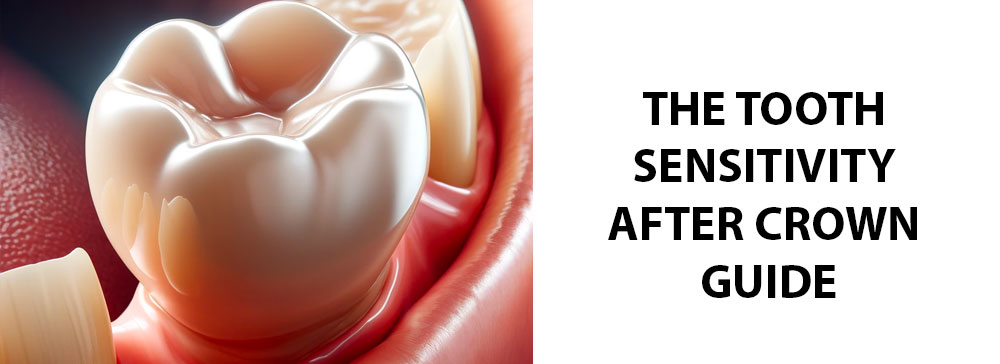Tooth Crown Pain

Tooth crown pain can be a frustrating and concerning experience for anyone who has undergone a dental crown procedure. The primary purpose of a dental crown is to protect a tooth that has been damaged by decay, cracked, or weakened in some way. However, in some cases, individuals may experience sensitivity, discomfort, or pain after receiving a dental crown. This pain can stem from a variety of sources and understanding the potential causes is crucial for finding the right solution.
One of the most common causes of tooth crown pain is an improperly fitted crown. If the crown does not fit perfectly over the tooth, it can lead to issues such as uneven biting surfaces, which might put unnecessary strain on the tooth and the surrounding gums, resulting in pain. Moreover, an ill-fitting crown can leave spaces between the crown and the natural tooth, where bacteria can accumulate, potentially leading to infections or further decay.
Another significant cause of pain after a crown procedure is the tooth’s pulp. The pulp is the innermost part of the tooth containing nerves and blood vessels. During the preparation of the tooth for a crown, the pulp can become irritated. If the irritation is severe, it might lead to pulpitis, an inflammatory condition that can cause significant pain. In some cases, the pulp may need to be removed through a root canal procedure to alleviate the pain and prevent infection.
Sensitivity after a crown procedure can also be due to the cement used to secure the crown in place. Some individuals might be sensitive to certain types of dental cement, which can cause an allergic reaction or irritation. This sensitivity can manifest as sharp pains or a dull ache, depending on the severity of the reaction.
Additionally, the process of preparing the tooth for a crown, which involves removing parts of the enamel, can expose dentinal tubules. These tubules are tiny channels that lead to the pulp, and when they are exposed, they can cause sensitivity, especially to hot and cold temperatures. This type of sensitivity can usually be managed with desensitizing toothpaste or varnishes applied by a dentist.
Furthermore, the temporary crown placed on the tooth while the permanent one is being made can also be a source of discomfort. Temporary crowns are not always as precisely fitted as permanent ones and can cause irritation to the gums or adjacent teeth. This discomfort is typically temporary and resolves once the permanent crown is placed.
It’s also worth noting that tooth crown pain can sometimes be related to underlying issues such as gum disease or bruxism (teeth grinding). Gum disease can cause the gums to recede, exposing more of the tooth and potentially the root, leading to sensitivity. Bruxism can put additional stress on the crowned tooth, especially if the crown is not designed to withstand such forces, leading to pain or discomfort.
What to Do About Tooth Crown Pain
If you are experiencing pain after a dental crown procedure, the first step is to contact your dentist. They can assess the situation and determine the cause of the pain. Depending on the cause, the solution might involve adjusting the crown, treating any underlying pulpitis or infection, or using desensitizing treatments for sensitivity.
In the meantime, there are several steps you can take to manage your discomfort. Using a soft-bristled toothbrush and gentle toothpaste can help minimize irritation. Avoiding extreme temperatures in foods and beverages can help reduce sensitivity. Over-the-counter pain relievers such as ibuprofen or acetaminophen can be used according to the package instructions to manage pain.
Preventing Tooth Crown Pain
While it’s not possible to entirely prevent the risk of pain after a crown procedure, there are steps you can take to minimize the risk. Choosing a skilled and experienced dentist is crucial, as they are more likely to ensure a precise fit and minimal trauma to the tooth and surrounding tissues. Maintaining good oral hygiene practices and attending regular follow-up appointments can also help identify any potential issues early on.
Conclusion
Tooth crown pain, while concerning, is generally manageable with the right approach. Understanding the potential causes and taking proactive steps towards prevention and early intervention can make a significant difference. If you’re experiencing discomfort or pain after a dental crown procedure, don’t hesitate to reach out to your dentist. With the right care and attention, it’s possible to resolve the issue and enjoy a healthy, pain-free smile.
FAQ Section
What are the most common causes of tooth crown pain?
+The most common causes of tooth crown pain include an improperly fitted crown, irritation of the tooth’s pulp, sensitivity to the cement used, exposure of dentinal tubules, and issues with the temporary crown. Underlying conditions like gum disease or bruxism can also contribute to the pain.
How can I manage tooth crown pain at home?
+To manage tooth crown pain at home, use a soft-bristled toothbrush and gentle toothpaste, avoid extreme temperatures in foods and beverages, and consider using over-the-counter pain relievers according to the package instructions. Maintaining good oral hygiene and avoiding irritants can also help.
When should I contact my dentist about tooth crown pain?
+You should contact your dentist as soon as possible if you are experiencing pain after a dental crown procedure. They can assess the situation, determine the cause of the pain, and provide the necessary treatment to resolve the issue. Prompt action can prevent more serious complications and alleviate your discomfort.
Can tooth crown pain be prevented?
+While it’s not possible to entirely prevent the risk of pain after a crown procedure, choosing a skilled dentist, maintaining good oral hygiene, and attending regular follow-up appointments can help minimize the risk. Early identification and treatment of any issues can also reduce the likelihood of developing significant pain.
How long does tooth crown pain typically last?
+The duration of tooth crown pain can vary significantly depending on the cause. In some cases, the pain may resolve on its own within a few days to a week after the procedure. However, if the pain persists or worsens, it’s essential to consult with your dentist for proper evaluation and treatment. With the right care, most cases of tooth crown pain can be resolved, allowing for a comfortable and healthy smile.

